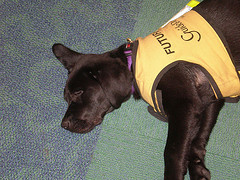
Joel John Roberts is the CEO of PATH Partners (an alliance of agencies that deal with homelessness), as well as the author of the book titled How To Increase Homelessness. He is also the publisher of Poverty Insights, a national online journal on homelessness, housing, and poverty, and he covers the “LA Homelessness” beat for Examiner.com.
Roberts brings us news of the results of a lawsuit that’s been filed in mid-July of 2009. The suit was brought by the Housing Rights Center (HRC), and presented under the Americans with Disabilities Act, the Rehabilitation Act, and the Fair Housing Act.
The issue? The ability of the disabled homeless to bring their service animals into shelters.
Roberts reports on Examiner.com:
‘It’s a serious and systemic problem,’ commented Michelle Uzeta, Director of Litigation for HRC. ‘These shelters put people with disabilities in the impossible position of having to choose between the service animals that provide them with needed disability-related assistance and the ability to access emergency shelter services.’
Recently, a settlement occurred with the Los Angeles Homeless Services Authority (LAHSA), the joint city and county authority on homelessness that directs all LAHSA-funded agencies to provide reasonable modifications to their policies and facilities for homeless people with service animals.
While the critics cite a variety of objections to this mandate — including disruption of the shelter environment — from a legal standpoint, is seems that the issue is settled. There is a disproportionate percentage of the homeless that are physically or mentally disadvantaged, and a number of them rely on service animals to function on a daily basis.
What do you think? Seeing-eye dogs are allowed on public transportation, so should they be allowed into homeless shelters? Should other service animals have a place in these environments?
Source: “Los Angeles homeless agencies mandated to take in service animals,” Examiner.com, 07/30/10
Image by libookperson, used under its Creative Commons license.
Visit Us on Facebook: Humane Exposures Publishing , downTownUSA, Maggots in My Sweet Potatoes, It’s More Expensive To Do Nothing










